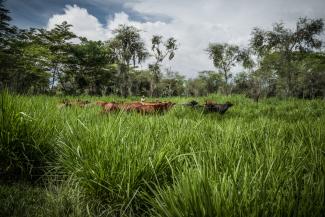The Amazon rainforest is the largest remaining tropical rainforest in the world. By absorbing more than three percent of global carbon dioxide emissions, it helps avoid global climate change’s worst effects. However, deforestation driven by unsustainable land use change for agriculture, threatens to turn the region into a net carbon producer. The project seeks to reduce commodity-driven deforestation and associated greenhouse gas emissions from high biodiversity regions that supply agricultural products to international and domestic companies.
Amazonia Connect will work within entire supply chains to promote Low Carbon Agriculture (LCA) approaches to production in select landscapes of Brazil, Colombia, and Peru. As farmers implementing
LCA principles avoid deforestation and are trained to consider ecosystem services, this approach addresses the interlinked challenges of climate change and biodiversity conservation. LCA also supports
sustainable increases in agricultural production, thus increasing livelihoods and enhancing climate resilience.
HOW DOES THE ACTIVITY WORK?
Amazonia Connect will focus on landscapes that are globally significant for their biodiversity, but also at risk of deforestation from commodity production. Producers of livestock and crops, especially smallholders, lack access to the knowledge, finance, tools, and incentives to switch to low-carbon and deforestation-free systems. While there are several initiatives to tackle commodity-driven deforestation
and promote biodiversity conservation in the Amazon, they have been in isolation. The project will connect these “innovative dots” and bring together supply (producers) with demand (buyers) efforts.
The project will provide technical assistance and monitoring tools to guarantee the production and verification of low-carbon and deforestation-free products. These verified products will then be purchased by private sector companies that have invested directly into LCA to fulfill their international deforestation-free commitments. As banks usually perceive investments in smallholder agriculture as high-risk, high cost, and with low returns, the private sector’s participation unlocks sustainable finance opportunities and enables access to inputs, services, and credit. Also, the activity will turn research into actionable recommendations and best practices for policymakers, regional authorities, financial institutions, and private companies.
EXPECTED RESULTS
- Expand the adoption of LCA and Deforestation-Free Production models in key Amazon landscapes across 214,806 hectares with 5,441 producers.
- Implement advanced supply chain monitoring systems in at least ten private companies buying from producers in the region, ensuring deforestation-free sourcing and biodiversity monitoring.
- Leverage and link $5 million in finance and incentives for producers to adopt LCA, while promoting additional private sector engagement and long-term sustainability of efforts.
- Connect 129,000 hectares of farmland with digital tools and technology to improve access to quality inputs, services, and finance for producers.
- Turn research into actionable knowledge for supply chain stakeholders through policy briefs, scientific papers, and/or presentations that reach policymakers, companies, and multi-stakeholder platforms.

